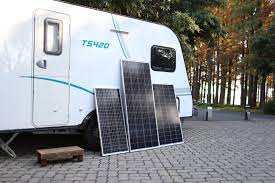The Rise of Eco-Friendly RVs
In recent years, the trend towards eco-friendly living has extended to the world of recreational vehicles (RVs). As more people seek sustainable and environmentally conscious lifestyles, manufacturers have responded by developing RVs that minimize their carbon footprint and reduce their impact on the environment.
Benefits of Eco-Friendly RVs
Eco-friendly RVs offer a host of benefits for both owners and the planet. These vehicles are designed with energy-efficient features that help reduce fuel consumption and emissions. Solar panels, energy-efficient appliances, and advanced insulation materials are just some of the eco-friendly elements incorporated into modern RV designs.
By using renewable energy sources such as solar power, eco-friendly RV owners can enjoy greater independence from traditional fuel sources. This not only reduces operating costs but also allows travelers to explore remote locations without relying on external power hookups.
Environmental Impact
The environmental impact of traditional RVs can be significant due to their reliance on fossil fuels and high energy consumption. Eco-friendly RVs help mitigate these effects by promoting sustainable practices such as water conservation, waste reduction, and responsible disposal of resources.
Reducing greenhouse gas emissions and minimizing waste production are key goals of eco-friendly RV design. By choosing an environmentally conscious vehicle, owners can enjoy the freedom of travel while minimizing their ecological footprint.
The Future of Sustainable Travel
As awareness of environmental issues continues to grow, the demand for eco-friendly RVs is expected to rise. Manufacturers are investing in research and development to create innovative solutions that combine comfort and sustainability in one package.
From electric-powered motorhomes to lightweight materials that improve fuel efficiency, the future looks bright for eco-conscious travelers seeking a greener way to explore the great outdoors. With a focus on reducing waste and conserving resources, eco-friendly RVs represent a step towards a more sustainable future for all.
5 Benefits of Eco-Friendly RVs: Sustainable Travel with a Smaller Environmental Impact
- Reduced carbon footprint and lower emissions contribute to a cleaner environment.
- Energy-efficient features help save on fuel costs and promote sustainable travel practices.
- Solar panels provide renewable energy sources for increased independence during trips.
- Innovative eco-friendly designs offer a more comfortable and environmentally conscious travel experience.
- Promotes responsible resource management through water conservation and waste reduction initiatives.
Five Drawbacks of Eco-Friendly RVs: Costs, Charging Challenges, and Maintenance Complexities
- Higher upfront cost compared to traditional RVs
- Limited availability of charging stations for electric RVs
- Potential limitations in range and driving distance on a single charge
- Complexity of maintenance and repair for specialized eco-friendly components
- Initial investment in solar panels or other renewable energy sources may require significant financial commitment
Reduced carbon footprint and lower emissions contribute to a cleaner environment.
Reduced carbon footprint and lower emissions from eco-friendly RVs play a crucial role in fostering a cleaner environment. By incorporating energy-efficient technologies and sustainable practices, these vehicles help minimize the impact of travel on the planet. With fewer greenhouse gas emissions released into the atmosphere, eco-friendly RVs contribute to improving air quality and preserving natural ecosystems. Choosing an eco-friendly RV not only enhances the travel experience but also supports efforts to create a more sustainable and environmentally conscious world for future generations.
Energy-efficient features help save on fuel costs and promote sustainable travel practices.
Energy-efficient features in eco-friendly RVs play a crucial role in not only saving on fuel costs but also promoting sustainable travel practices. By utilizing technologies such as solar panels, energy-efficient appliances, and advanced insulation materials, these RVs reduce their reliance on traditional fuel sources, leading to significant savings for owners. This emphasis on energy efficiency not only benefits the wallet but also contributes to a more sustainable approach to travel by minimizing carbon emissions and promoting eco-conscious behaviors on the road.
Solar panels provide renewable energy sources for increased independence during trips.
Solar panels on eco-friendly RVs offer a significant advantage by providing a renewable energy source that enhances independence during trips. By harnessing the power of the sun, RV owners can generate electricity to charge batteries, run appliances, and power various onboard systems without relying solely on traditional fuel sources. This not only reduces the environmental impact of the vehicle but also allows travelers to explore remote locations off the grid while enjoying the convenience of sustainable energy.
Innovative eco-friendly designs offer a more comfortable and environmentally conscious travel experience.
Innovative eco-friendly designs in RVs not only prioritize sustainability but also enhance the overall travel experience by providing a more comfortable and environmentally conscious journey. These advanced designs incorporate energy-efficient features, such as solar panels and eco-friendly materials, that not only reduce the vehicle’s carbon footprint but also contribute to a more pleasant and relaxing travel environment. Travelers can enjoy the dual benefits of comfort and environmental consciousness, making their adventures on the road both enjoyable and sustainable.
Promotes responsible resource management through water conservation and waste reduction initiatives.
One significant pro of eco-friendly RVs is their promotion of responsible resource management through water conservation and waste reduction initiatives. By incorporating features such as low-flow faucets, water-saving toilets, and efficient waste disposal systems, these vehicles help travelers minimize their environmental impact while on the road. This focus on sustainable practices not only benefits the planet by conserving precious resources but also encourages RV owners to adopt eco-conscious habits that can be carried into their everyday lives.
Higher upfront cost compared to traditional RVs
One significant con of eco-friendly RVs is their higher upfront cost when compared to traditional RVs. The incorporation of energy-efficient technologies, sustainable materials, and eco-friendly features often leads to a higher price tag for these vehicles. While the long-term benefits of reduced operating costs and environmental impact may offset this initial investment over time, the higher upfront cost can pose a barrier for those looking to purchase an eco-friendly RV. However, as technology advances and demand increases, we may see more affordable options becoming available in the future.
Limited availability of charging stations for electric RVs
One significant con of eco-friendly RVs, particularly electric models, is the limited availability of charging stations. Unlike traditional fuel-powered RVs that can easily refuel at gas stations along the way, electric RV owners may face challenges finding adequate charging infrastructure for their vehicles. This limitation can restrict travel routes and require careful planning to ensure access to charging points, potentially adding complexity and uncertainty to the travel experience. As the demand for electric vehicles grows, expanding the network of charging stations will be crucial to support the widespread adoption of eco-friendly RVs and enhance their practicality for adventurous travelers.
Potential limitations in range and driving distance on a single charge
One significant con of eco-friendly RVs is the potential limitation in range and driving distance on a single charge. While advancements in electric and hybrid RV technology have made significant strides in recent years, the current infrastructure for charging stations may not be as widespread or convenient as traditional fueling options. This can restrict the freedom of RV travelers who rely on electric or hybrid vehicles, as they may need to carefully plan their routes to ensure access to charging stations along the way. Additionally, the need for frequent recharging can extend travel times and limit the distance that eco-friendly RVs can cover in a single journey, posing a challenge for those seeking extended or remote adventures.
Complexity of maintenance and repair for specialized eco-friendly components
One significant con of eco-friendly RVs is the complexity of maintenance and repair for specialized eco-friendly components. Unlike traditional RVs, which may have more standardized parts and systems, eco-friendly RVs often incorporate advanced technologies such as solar panels, energy-efficient appliances, and specialized insulation materials. This can make servicing and repairing these components more challenging and potentially more costly. Owners may need to rely on technicians with specific expertise in eco-friendly systems, leading to longer wait times for repairs and higher maintenance expenses. The complexity of maintaining these specialized components can be a drawback for those seeking a simpler and more straightforward RV ownership experience.
Initial investment in solar panels or other renewable energy sources may require significant financial commitment
One notable con of eco-friendly RVs is the substantial initial investment required for integrating solar panels or other renewable energy sources into the vehicle. While these sustainable technologies offer long-term cost savings and environmental benefits, the upfront financial commitment can be a barrier for some prospective RV owners. The purchase and installation of solar panels, energy-efficient appliances, and other eco-friendly features may require a larger budget compared to traditional RV models. However, it’s important to consider this investment as a long-term solution that not only reduces operating costs but also contributes to a more sustainable way of traveling and living on the road.




